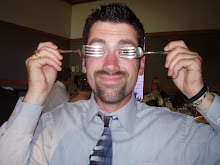- Pope John Paul II
[In response to Ben's comment on the last post... It's gotta be good to warrant a whole post response! :)]
So without further ado - Ben is right about a number of things:
- The CNS is a fringe group that, to be honest, gives the Church in the U.S. a bad name. I can understand a renewal of Catholic education (which has certainly gone astray; see: Georgetown), but not the way they go about it most of the time.

- Speaking of fringe groups, Rush Limbaugh should have been deported to Greenland long ago. They don't have radio there, right?
- Being a "Christian" doesn't always mean that you're acting like Christ.
But there are a couple of fundamentally wrong points, too:
1. Pope Pius XII was a shining light during the Holocaust. Any reasoning I give now has been tainted by the claim that they're just "excuses," but the fact is that Pius XII got a bad rap from pop culture years after WWII (see: the 1963 play "The Deputy" by Rolf Hochhuth). Many Jewish leaders have credited Pius XII for saving more than 860,000 Jews. But to a certain extent that's beside the point, because...
2. Like too many people, there is a crucial misunderstanding here of the truth of Papal Infallibility. It does not mean that the Pope never makes mistakes. Does the Pope sin? Yes! (JPII went to confession weekly) Were the Crusades evil and wrong? Yes! Was the Inquisition an act of pride, violence and sin? Yes! Again, I repeat - any Catholic who claims that Popes don't make mistakes is uninformed and misrepresents the Church. Per the post title, I'm willing to bet that I would own the Pope in a game of H-O-R-S-E.
 Papal Infallibility, as restated in the document Lumen Gentium from Vatican II, only applies when "by a definitive act he proclaims a doctrine of faith or morals" (LG §25) Infallibility only applies to the teaching charism of the papacy, and only in matters of faith and morals. So we're talking about things like the presence of Christ in the Eucharist, the Immaculate Conception of Mary, the evil of murder, the teachings on marriage, etc.
Papal Infallibility, as restated in the document Lumen Gentium from Vatican II, only applies when "by a definitive act he proclaims a doctrine of faith or morals" (LG §25) Infallibility only applies to the teaching charism of the papacy, and only in matters of faith and morals. So we're talking about things like the presence of Christ in the Eucharist, the Immaculate Conception of Mary, the evil of murder, the teachings on marriage, etc.This, of course, was the central concern during JFK's presidential campaign and the reason he's been our only Catholic president. "Will the Pope pick our Supreme Court justices? Restructure our legislature? Do away with the precious electoral college?" And the answer is, of course, no. The Pope has no right within his ministry to directly affect the temporal structures of nations and states. Now, he might teach on those elements of secular groups that pertain to moral infringements (see Pope Leo XIII's Rerum Novarum, which criticizes certain capitalistic labor standards). But there's a fine line between teaching on truths of faith and morals and executing those same truths. That's why, praise God, the Papacy no longer has the political and military authority that it once did.
So now that we all love the Pope, how 'bout some randomness? :)
And speaking of Popes, happy 82nd birthday to Benedict XVI yesterday!
Peace, y'all.
PM
----------------
Now playing: Eric Hutchinson - You Don't Have to Believe Me
via FoxyTunes



















